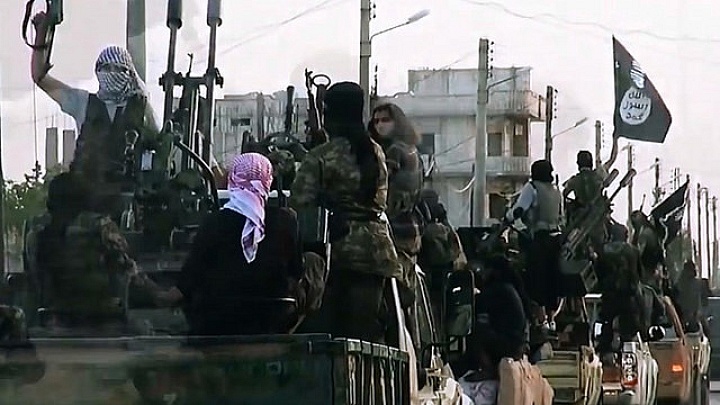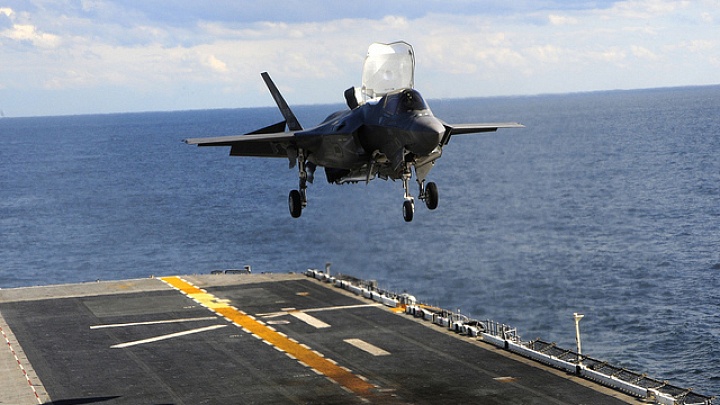
U.S. policy in Iraq is truly perplexing. Like many things President Obama does abroad, he appears to be trying to have it both ways: We are striking ISIS militants, yet also engaging in humanitarian operations near Mount Sinjar. We are intervening to avoid another “Benghazi,” which may take months, yet we are also not becoming Iraq’s de facto air force. We’re helping our Kurdish allies, yet not doing much in the way of forcing Baghdad to change its course. Even if ISIS were wiped off the map tomorrow, Iraq would still be a mess.
To those who have grown hoarse over the past three years calling for some kind of intervention in Syria – limited airstrikes, a no-fly zone, etc. – to prevent the kind of humanitarian disaster, refugee crisis, and bloodbath of innocent Syrians killed indiscriminately by barrel bombs, U.S. airstrikes in northern Iraq are even more perplexing. Most Americans had probably never even heard of Yazidis before last week, and yet Sunday talk shows were lit up with calls to protect this persecuted minority.
The ISIS threat is real. But contrary to fear mongers in Congress, they do not have the capacity to strike us here, much less the intent (yet). Take Senator Lindsey Graham’s comment, “If [Obama] does not go on the offensive against ISIS, ISIL, whatever you guys want to call it, they are coming here.” Really? They’re going to storm Baghdad and Erbil, then hop on a plane and head this way? Yes, we do not want ISIS to gain a foothold in the middle of the Middle East. But the answer was not leaving a few thousand troops stationed in the Green Zone – the answer was preventing Syria from becoming a lawless state three years ago by intervening more forcefully when the opposition was still moderate, less fractured, and had momentum on its side. This could have entailed a limited no-fly zone in Aleppo, Idlib, Raqqa and Deir Ezzor, all places that ISIS has established a toehold in. No, this would not have defeated the regime or prevented the bulk of the atrocities in the Damascus suburbs or Homs. This may not even have prevented the August 2013 chemical attacks. But at least it would have signaled resolve, preempted ISIS’s rise, and prevented the violence from spilling into Iraq and destabilizing its north. Now, Iraqi Kurdistan is seen as a prosperous buffer state to be courted by its neighbors, including even the Turks. ISIS, if it has left any positive imprint on regional politics, has managed to unite a lot of strange bedfellows.
Let’s not scare ourselves into inaction or suggest, as some in Washington have, that ISIS poses some kind of existential threat to the United States or is a bogeyman of bin Laden proportions.
And so nearly a year after President Obama reneged on his “red line” pledge, we are engaging in limited airstrikes and carrying out humanitarian missions to save Iraqi minorities. Yet even this mission appears more aimed at checking a box than actually resolving the ISIS threat (which if I’m Abu Bakr al-Baghdadi, chances are I just cross back into Syria, which is a no-go zone for Americans) – it feels like the work of a reluctant realist, not a liberal interventionist. The trouble with such humanitarian missions is that our resolve does not match that of actors on the ground, a point made over a decade ago by Daniel Byman and Matthew Waxman. As low-cost, low-commitment uses of force, they can signal weakness to our adversaries (a point that Republican lawmakers have pounced upon). Yet, the U.S. possesses very limited tools to coerce groups like ISIS into laying down their arms. We are marvelously bad at projecting power when our means are limited and our ends are unclear. By basically telling the world, “We will not escalate or ever deploy boots on the ground,” we are signaling, “Yeah, we’re concerned, but not willing to do anything about it.” To be fair, it’s not all Obama’s fault. As David Baldwin once put it, “The theme of such explanations is not ‘he had the cards but played them poorly,’ but rather ‘he had a great bridge hand but happened to be playing poker.’
Moreover, he is playing the hand dealt to him. Americans are not gung-ho about using force abroad unless two criteria are met: we can win, and our aims are clear. Despite their religiosity, Americans are surprisingly not keen on humanitarian interventions. Wars in Kosovo and Libya, for example, were not popular at all (Somalia was the only humanitarian intervention that enjoyed widespread support).
There are those who say that the swiftness with which ISIS has sliced its way through Iraq suggests a kind of Darwinian process for Islamist groups, that ISIS has found some kind of secret recipe for success that other groups lack. Not sure I buy it. ISIS may emerge the last rebel group standing for the same reasons as the Bolsheviks did: They are the most willing to resort to mass violence. Rebel movements, even religious ones like ISIS, have always been amalgams of committed fighters and opportunists (My guess is that the Tamil Tigers, which employed an air force, navy, and full-standing army, would have made short shrift of ISIS in their heyday). Let’s not scare ourselves into inaction or suggest, as some in Washington have, that ISIS poses some kind of existential threat to the United States or is a bogeyman of bin Laden proportions.
ISIS has been harsh but at the same time strategic about its policies in areas it controls. For example, it has implemented so-called “confidence-building measures” near cities like Mosul by removing security barriers, restoring electricity and paying state workers’ salaries. In this way, analysts say it has learned the fateful mistake of its precursor, al-Qaeda in Iraq, which alienated locals by using too much wanton violence. ISIS is not concerned with winning hearts and minds in the villages they control. When they first arrive, they use “goodness” to attract locals to their cause, but then they quickly go about imposing their conservative brand of Islam, which follows a literal interpretation of the Koran. As one defector told the BBC, Once ISIS succeeded in attracting people they changed dramatically, from being good to being cruel and harsh.”
ISIS fighters tend to be young and mostly foreigners (i.e. Egyptians, Jordanians), not native Iraqis or Syrians. The logic here is that younger non-natives are easier to radicalize. Some of the recruits, according to the BBC, are pilfered from less radicalized factions of the Free Syrian Army. Towns newly taken over by ISIS are often policed by outsiders. ISIS recruits are brainwashed first and trained to use firearms second. They are indoctrinated not by reading up on sharia law or the principles of Islam but rather with the views of the Islamic State. Only once this first stage was complete were fighters then trained to conduct military exercises.
Obama is finally discovering that he cannot exit Iraq, much less the region, and pivot to fixing America or deterring the Chinese as speedily as he wanted. A group he dismissed earlier this year as a kind of junior-varsity team of Islamist extremists has pulled off the impossible: It has gotten Obama to use force after promising to pull us out of Iraq. If ISIS unites the region in the meanwhile, even if it keeps U.S. forces anchored there indefinitely or means limited interventions into Syria, this may signal a welcome turning point for the Middle East. Not all U.S. military interventions in Iraq are bad ideas.
[Photo courtesy of Flickr Commons.]



The best Policy is to let Muslims kill Musims. When on e side starts to dominate the other by overwhelming force or use of terrorist tactics such as mistreatment of civilians, beheading, etc, then they are you your target to be suppressed. Where insurgent groups are successful and show civility in the treatment of prisoners and civilians, those are the ones you should consider supporting and defending if need be. Put the Kurds and (reluctantly), the Maliki government in that category. Watch how the Iranians conduct their support of the current Iraqi government…conclusions can be drawn from both their capability and their conduct on the battlefield toward prisoners and civilians. Can they be trusted, do they have a moderate side?
Iranians, like the Russians of WWII, may be the allies of necessity, if not choice.
I’m not sure intervention in Syria would have provided the answer – look at the state of Libya, and the West intervened there to help topple the dictatorship. The point is that it might not be as simple has intervening to help topple Assad – history has shown that if a rebellion is given assistance they generally fail to hold on to power in the aftermath.
The reason for Sen. Graham’s hype is the GOP base; unless there is some imminent threat they are in no mood for more foreign adventures. Thus the need to paint the ISIS as an imminent threat. Sen. Graham knows full well that the ISIS is not likely to be able to mount a transatlantic attack within the next year or two.
I am more concerned about the reported large number of its members who possess European passports and would be able to get back into Western Europe for strikes there and maybe pass undetected into our country and likewise strike; but both possibilities only become possible if the ISIS is able to establish a real stable governing state – which seems to be their immediate goal.